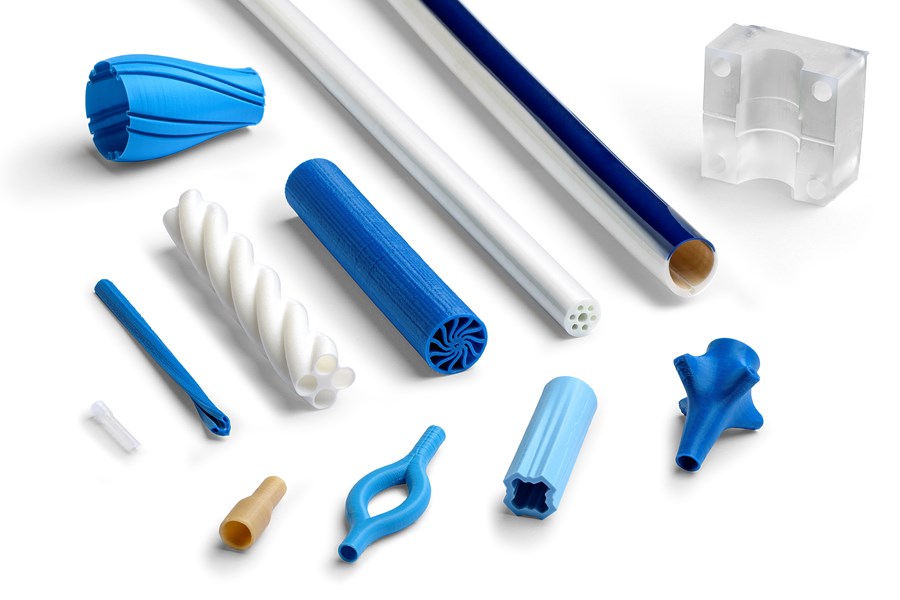Advanced Additive Manufacturing
Spectrum has developed groundbreaking additive manufacturing technologies, utilizing proprietary processes and medical-grade materials to create components with complex tolerances, geometries, and features.

Advanced Additive Manufacturing
Spectrum has developed groundbreaking additive manufacturing technologies, utilizing proprietary processes and medical-grade materials to create components with complex tolerances, geometries, and features.

Additive manufacturing (AM), also known as 3D printing, is an innovative suite of advanced technologies that enables the fabrication of medical components and products with remarkably complex and high-resolution features which often cannot be achieved within the constraints of conventional manufacturing methods. Compared to traditional subtractive machining methods, AM is more efficient and can deliver functional prototypes into the hands of medical engineering teams within a matter of days, instead of weeks. Spectrum has developed groundbreaking, proprietary AM technologies for creating medical products that the competition cannot, such as high-precision, medical-grade single and multi-lumen tubing—a first in the industry.
Additive manufacturing is a rapidly advancing field as new technologies, equipment, and specialized materials continue to enter the market. Spectrum’s industry-leading AM capabilities enable more creative design, innovative rapid prototyping, and seamless transition to high-volume manufacturing.
Benefits of Spectrum’s additive manufacturing capabilities and services include:
Spectrum’s advanced additive manufacturing technologies create components for medical devices, including:
Catheter Technologies
Medical Molding
Tubing
Spectrum has developed proprietary additive manufacturing technologies for manufacturing high-precision, medical-grade tubing (single and multilumen tubing) that is not extrusion-based.
Medical-Grade 3D Printing Filament
Spectrum also formulates and manufactures its own medical-grade 3D printing filaments for various materials and sizes in-house, assuring the highest quality, control, and availability.
Spectrum uses additive manufacturing technologies to process all medical-grade thermoplastic materials. These include Nylon, Pebax®, polypropylene, polycarbonate, acrylonitrile butadiene styrene (ABS), polylactic acid (PLA), PEEK, polyetherketone (PEK), high impact polystyrene (HIPS), Urethanes, and custom materials.
Product design and performance parameters include:
Quick-turn prototyping is essential in medical device manufacturing today. Time to market is a top priority for medical device manufacturers—delivering functional prototypes into the hands of all stakeholders as soon as possible allows for more-informed decision-making and shorter time to market.
Lead times can be as short as:
Spectrum has constructed a state-of-the-art cleanroom for its additive manufacturing operations, which allows sensitive and/or mission-critical materials and components to be processed inside a cleanroom environment. The cleanroom houses additive manufacturing equipment and materials, including 12 production proprietary thermoplastic machines capable of running 24/7 and remotely monitored anywhere in the world. Applications vary from R&D prototypes to production-ready medical use parts, including in-human devices. The cleanroom is certified Class 7.
Bringing a medical device to market can take years and requires deep expertise in identifying product requirements and the best product design to meet clinical needs. Spectrum’s additive manufacturing capabilities allow medical-device designers to select from a wide range of medical-grade plastics with specifically engineered material characteristics and design components, including, multi-material and multi-dimensional builds.
For more information on AM, or to discuss if AM is a good choice for your next project, please contact us to speak directly with our technical experts.
We receive a wide variety of requests, ranging from "napkin-sketch" to highly detailed and specific designs and everything in between. We even had a customer design their part around 3D printing exclusively through us.
Any time is ideal for reaching out to the AM hub. Usually, customers benefit more early on as they can decide the materials, design, dimensions, etc., with quick iterations instead of going with a specific design right into larger-scale testing. However, the customer can contact the AM hub and find us beneficial at any point.
If you have a design to test out, whether it involves a tube or a 3D-printed component, feel free to contact us! We welcome challenges and constantly evolve and grow our hubs to create the next breakthrough product that better serves our customers.
Contamination by airborne articles into the materials as a device is being made can impact its quality and function, causing risk to the patient. For example, to maintain clean the air, ISO Class 7 requires 60-150 air changes per hour to filter out contaminants.
The FDA expects all medical-device companies and their contract manufacturers to follow Good Manufacturing Practices (GMP). Cleanrooms classification ranges from ISO Class 5 to ISO Class 8, depending on how the product is used and its sterility requirements.
We have a HEPA air filtration system, pressure and temperature controls, electrostatic control systems, and protocols for ensuring purity. We also meet all FDA requirements for cleanliness and care of materials, equipment, and tools.